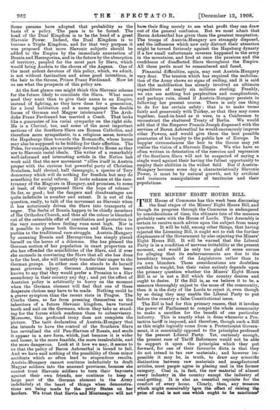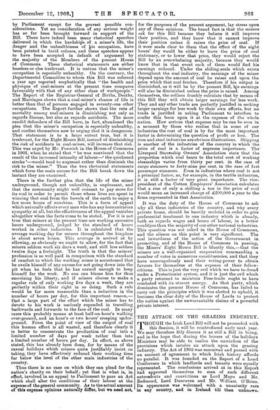THE MINERS' EIGHT HOURS BILL. T HE House of Commons has
this week been discussing
the final stages of the Miners' Eight Hours Bill, and though its progress through the Commons is endangered by considerations of time, the ultimate fate of the measure probably rests with the House of Lords. That Assembly is certain to receive much advice upon the subject from many quarters. It will be told, among other things, that having rejected the Licensing Bill, it ought not to risk the further displeasure of the Government by also rejecting the Miners' Eight Hours Bill. It will be warned that the Liberal Party is in a condition of nervous irritability at the present moment, and would be only too glad of some excuse for alleging that its embarrassments are due to the hereditary branch of the Legislature rather than to its own blunders. These considerations are doubtless entitled to weight, but their value entirely depends upon the primary question whether the Miners' Eight Hours Bill is or is not a Bill which the country desires and ought to desire. If the Bill is, as we believe it to be, a measure thoroughly unjust to the mass of the community, then it is the duty of the Lords to reject it, even though by so doing they may enable the Liberal Party to put before the country a false Constitutional issue.
The Bill is bad for this primary reason, that it invokes the power of Parliament to compel the whole community to make a sacrifice for the benefit of one particular industry. This is exactly what is done whenever a Pro- tective tariff is imposed, and therefore, though such a Bill as this might logically come from a Protectionist Govern- ment, it is essentially opposed to the principles professed by the present Liberal Party. Yet, curiously enough, the present race of Tariff Reformers would not be able to support it upon the principles which they put forward, for one of their favourite dicta is that they do not intend to tax raw materials; and however im- possible it may be, in truth, to draw any scientific distinction between raw materials and manpfactured articles, most people agree in placing coal in the former category. Coal is, in fact, the raw material of almost every industry in the country except the industry of coal-getting. It is also an essential requisite for the comfort of every home. Clearly, then, any measure which might conceivably brie the effect of raising the price of coal is not one which ought to be sanction& by Parliament except for the gravest possible con- siderations. Yet no consideration of any serious weight has so far been brought forward in support of the Bill. There have indeed been many rhetorical speeches delivered in which the hardshiis of a miner's life, the danger and the unhealthiness of Ilia occupation, have been painted in lurid colours, and these speeches appear to have been accepted in default of argument by the majority of the Members of the present House of Commons. These rhetorical statements are either baseless or else irrelevant. It is untrue that the miner's occupation is especially unhealthy. On the contrary, the Departmental Committee to whom this Bill was referred a year ago reported emphatically that " the health and physique of coal-miners at the present time compares favourably with that of any other class of workpeople." The Report of the Registrar-General of Births, Deaths, and Marriages shows that a coal-miner's chance of life is better than that of persons engaged in seventy-one other occupations. The Report further shows that the rate of mortality among coal-miners is diminishing not only as regards disease, but also as regards accidents. The more candid defenders of the Bill have, in fact, abandoned the plea that the miner's occupation is especially unhealthy, and confine themselves now to urging that it is dangerous. That statement is to a large extent true, but it is irrelevant, for the Eight Hours Bill, instead of diminishing the risk of accidents in coal-mines, will increase that risk. This was urged by Mr. Fenwick in the House of Commons in 1901, when he stated that " he was convinced that the result of the increased intensity of labour—' the quickened stroke '—would tend to augment rather than diminish the risk to the miner." Thus the two rhetorical statements which form the main excuse for the Bill break down the instant they are examined.
There is the further plea that the life of the miner undemround, though not unhealthy, is unpleasant, and that the community might well consent to pay more for its coal in order to permit those whose lives are spent in winning that coal from the bowels of the earth to enjoy a few more hours of sunshine. This is a form of appeal which naturally affects every man who has any humanitarian sympathy at all, but the effectiveness of the appeal vanishes altogether when the facts 'come to be stated. For it is not true that miners at the present time are working excessive hours underground, judged by the standard of hours worked in other industries. It is calculated that the average working day for miners throughout the kingdom is about seven hours. This average is arrived at by allowing, as obviously we ought to allow, for the fact that miners seldom work six days a week, and still less seldom twelve days a fortnight. The truth is that the miners' profession is so well paid in comparison with the standard of comfort to which the working miner is accustomed that he avails himself of any excuse for not going down into the pit when he feels that he has earned enough to keep himself for the week. No one can blame him for thus exercising his liberty, and if miners choose to make a regular rule of only workino.. five days a week, they are perfectly within their right in so doing. Such a rule would be far more reasonable than a reduction in the number of hours per day, for this important reason,— th,at a, large part of the effort which the miner has to devote to l'his work is uselessly expended in travelling backwards and forwards to the face of the coal. In many cases this probably means at least half-an-hour's walking over7ground, and an hour's or two hours' creeping under- ground. From the point of view of the output of coal this human effort is all wasted, and therefore clearly it is better to concentrate the production of coal into a limited number of days per week rather than into a limited number of hours per day. In effect, as above stated, this has already been done, for by means of the casual holidays which miners quite justifiably insist on taking, they have effectively reduced their working time far below the level of the other main industries of the country.
Thus there is no case on which they can plead for the nation's charity on their behalf ; yet that is what is, in effect, involved in an appeal to Parliament to pass an Act which shall alter the conditions of their labour at the expense of the general community. As to the actual amount of this expense opinions naturally differ, but we need not, for the purposes of the present argument, lay stress upon any of these opinions. The broad fact is that the miners ask for this Bill because they believe it will improve their position, and they know that it cannot improve their position unless it raises the price of coal. If it were made clear to them that the effect of the eight hours' day would be either to leave the price of coal stationary, or to lower that price, they would reject the Bill by an overwhelming majority, because they would know that in that event each of them would find his earnings reduced. Under the sliding-scale which exists throughout the coal industry, the earnings of the miner depend upon the amount of coal he raises and upon the price which that coal fetches. Therefore if his output is diminished, as it will be by the present Bill, kis earnings will also be diminished unless the price is raised. Among themselves, the colliers frankly calculate that by means of this Bill they will obtain larger earnings for less work. They and any other trade are perfectly justified in seeking larger earnings for less work by their own efforts, but no trade is justified in asking Parliament to interfere to confer this boon upon it at the expense of the whole nation. How serious that expense may be can be seen in a moment by those who realise that in some of our industries the cost of coal is by far the most important factor in determining the question of profit or loss. The iron and steel industries are obvious illustrations. Shipping is another of the industries of the country in which the price of coal is a factor of supreme importance. The Liverpool Steamship Owners' Association state that the proportion which coal bears to the total cost of working steamships varies from thirty per cent, in the case of cargo steamers to forty-nine per cent. in the case of fast passenger steamers. Even in industries where coal is not a principal factor, as, for example, in the textile industries, it is still a, factor of very great importance. The vice- president of the Cotton Employers' Association calculates that a rise of only a shilling a ton in the price of coal would mean an increased charge of £200,000 a year to the firms represented in that Association.
It was the duty of the House of Commons to ask why all these industries of the country, and why every private home, should be heavily mulcted in order to give preferential treatment to one industry which is already, both as regards wages and hours of labour, in a better condition than the majority of our other national industries. This question was not asked in the House of Commons, and the silence on this point is very significant. The real inwardness of the action of the Government in , promoting, and of the House of Commons in passing, the Miners' Eight Hours Bill is bluntly this,—that the miners are a well-organised corporation commanding a number of votes in numerous constituencies, and that they have unscrupulously used their voting-power to obtain favours for themselves at the expense of their fellow. citizens. This is just the very evil which we have to dread under a Protectionist system, and it is just the evil which a party returned to maintain Free-trade ought to have combated with its utmost energy. As that party, which dominates the present House of Commons, has failed to carry out the principles which it was elected to uphold, it becomes the clear duty of the House of Lords to protect the nation against the unwarrantable claims of a powerful private interest.































































 Previous page
Previous page